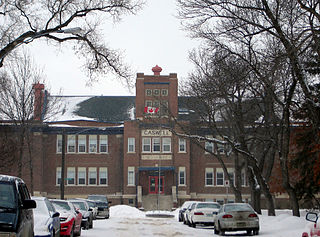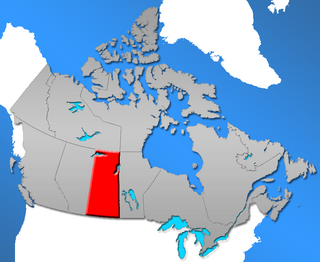
A community college is a type of undergraduate higher education institution, generally leading to an associate degree, certificate, or diploma. The term can have different meanings in different countries: many community colleges have an open enrollment policy for students who have graduated from high school, also known as senior secondary school or upper secondary school. The term usually refers to a higher educational institution that provides workforce education and college transfer academic programs. Some institutions maintain athletic teams and dormitories similar to their university counterparts.

The University of Regina is a public university located in Regina, Saskatchewan, Canada. Founded in 1911 as a private denominational high school of the Methodist Church of Canada, it began an association with the University of Saskatchewan as a junior college in 1925, and was disaffiliated by the Church and fully ceded to the university in 1934; in 1961 it attained degree-granting status as the Regina Campus of the University of Saskatchewan. It became an autonomous university in 1974. The University of Regina has an enrolment of over 15,000 full and part-time students. The university's student newspaper, The Carillon, is a member of CUP.

Saskatchewan Polytechnic is Saskatchewan's primary public post-secondary institution for technical education and skills training, recognized nationally and internationally for its expertise and innovation. Through program and course registrations, Saskatchewan Polytechnic serves 26,000 distinct students with programs that touch every sector of the economy. It operates campuses in Moose Jaw, Prince Albert, Regina and Saskatoon; and provides a number of courses and programs through distance education.

University College of the North (UCN)—formerly Keewatin Community College—is a post-secondary institution located in Northern Manitoba, Canada, with two main campuses in The Pas and Thompson, respectively. UCN has a student body of approximately 2,400 annually and a staff of approximately 400.
Melfort is a city in Saskatchewan, Canada, located approximately 95 kilometres (59 mi) southeast of Prince Albert, 172 kilometres (107 mi) northeast of Saskatoon and 280 kilometres (170 mi) north of Regina.
The Gabriel Dumont Institute (GDI), formally the Gabriel Dumont Institute of Native Studies and Applied Research Inc., is a non-profit corporation serving the educational and cultural needs of the Saskatchewan Métis and Non-Status Indian community, and is the officially-designated education arm of the Métis Nation—Saskatchewan (MN-S).

Lakeland College is a post-secondary college in Alberta, Canada. It is publicly funded, and maintains two campuses in Vermilion and Lloydminster. Lakeland serves over 7,000 students through the academic year with 2,223 studying full- and part-time.
Highway 3 is a major provincial highway in the Canadian province of Saskatchewan. It runs from the Alberta border, where it continues west as Alberta Highway 45, to the Manitoba border, and then continues east as Highway 77. Highway 3 is about 615 km (382 mi.) long. The CanAm Highway comprises Saskatchewan Highways 35, 39, 6, 3, as well as 2. 59.7 miles (96.1 km) of Saskatchewan Highway 3 contribute to the CanAm Highway between Melfort and Prince Albert.

Highway 35 is a paved, undivided provincial highway in the Canadian province of Saskatchewan. It runs from the U.S. border at the Port of Oungre north to a dead end near the north shore of Tobin Lake. The southern end of Highway 35 is one segment of the CanAm Highway, which is an international highway connecting Canada, the United States, and Mexico. Highway 35 is about 569 kilometres (354 mi) long.

Education in Saskatchewan, Canada, teaches a curriculum of learning set out by the Government of Saskatchewan through the Ministry of Education. The curriculum sets out to develop skills, knowledge and understanding to improve the quality of life. On June 22, 1915, Hon. Walter Scott, Premier and Minister of Education, set out as his mandate the "purpose of procuring for the children of Saskatchewan a better education and an education of greater service and utility to meet the conditions of the chief industry in the Province, which is agriculture". Education facilitates the cultural and regional socialization of an individual through the realisation of their self-potential and latent talents. Historically, the region of Saskatchewan needed successful homesteaders so the focus was to develop a unified language for successful economic trading, and agricultural understanding to develop goods, livestock and cash crops to trade. After the mechanized advancements following the Industrial Revolution and World War II, the primary employment agriculture sector of farming was not as labour-intensive. Individuals focused on secondary industries such as manufacturing and construction, as well as tertiary employment like transportation, trade, finance and services. Schools became technologically more advanced and adapted to supply resources for this growing demand and change of focus.

Saskatchewan Soccer Association (SSA) is the governing body for soccer (Association Football) in the Canadian province of Saskatchewan. The association was formed in 1905.
Great Plains College is a regional college in that provides post-secondary education in the western part of the province. It currently offers post-secondary certificate, diploma and degree programs — as well as university programming, skills and safety training, adult basic education and English language training - through campuses in Swift Current, Kindersley and Warman as well as program centres in Biggar, Maple Creek and Rosetown. Great Plains College was formed via a 2008 merger between Cypress Hills Regional College and Prairie West Regional College.

Higher education in Canada includes provincial, territorial, Indigenous and military higher education systems. The ideal objective of Canadian higher education is to offer every Canadian the opportunity to acquire the skills and knowledge necessary to realize their utmost potential. It aspires to cultivate a world-class workforce, enhance the employment rate of Canadians, and safeguard Canada's enduring prosperity. Higher education programs are intricately designed with the perspective of the learner in focus, striving to mitigate risks and assure definite outcomes.

Historically, Saskatchewan's higher education system has been "significantly shaped" by demographics. In 1901, six years prior to the 1907 founding of a university in Saskatchewan, the urban population in Saskatchewan was 14,266 (16%) while the rural population was 77,013 (84%). One hundred years later, the proportions had changed significantly: urban population in 2001 was 629,036 (64%) while the rural population was 349,897 (36%). Over time the province's higher education system has changed significantly in response both to this demographic shift and to provincial politics.
North West College is a regional college with two primary campuses in Meadow Lake and North Battleford providing adult educational training in the northwest region of Saskatchewan, Canada. Covering a region of 44,000 km2, North West College is committed to rural and First Nations education. In 2017-18 North West offered programming in 21 communities including 12 First Nations.

Six Nations Polytechnic (SNP) is a Haudenosaunee-governed Indigenous institute on Six Nations of the Grand River First Nation. SNP is an Indigenous Institute, the third pillar of post-secondary education in Ontario, as recognized by the Indigenous Institutes Act of 2017, The Six Nations of the Grand River First Nation are the Mohawk, Cayuga, Onondaga, Oneida, Seneca, and Tuscarora. The Six Nations of the Grand River First Nation reserve acreage at present covers some 46,000 acres (190 km2) near the city of Brantford, Ontario. Six Nations Polytechnic has two campuses, one located in Ohsweken and one located in Brantford.

Iohahi:io Akwesasne Education & Training Institute is an Aboriginal-owned and controlled post-secondary institution for the Mohawks of Akwesasne.












